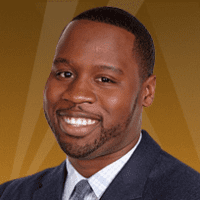Kmele Foster is excited, and he thinks you should be too.
He’s the Lead Producer of FreeThink – a media company that wants to make sure you know about the exciting innovations and innovators coming down the pike. “We tell stories about the people who are changing the world and the important big ideas that are changing the world and the new innovations that are on the horizon.”
While the risk of a startup is always present, Kmele feels like FreeThink is worth it. “Well, it would be silly not to be aware of the risks associated with what’s going on in the space. But I am still very much aware of the opportunity. The reality is that the appetite for content is still growing and the interest in finding new, interesting voices that resonate with you is something that a lot of people are still doing. So, there’s definitely an opportunity. And there’s no question that there will always be a demand. It’s a question of whether or not you’re able to find the right kind of stories to tell.”
That’s where Freethink came in: “Freethink is a company that was born out of a partnership of four like-minded souls, who all wanted to create media products and content that resonated with people. That’s what we think is the most important story of the moment, it’s the fact that we live at the best, most incredible time in human history. A time when people have this enormous individual capacity and ability because of all the technology at our disposal, to make massive change in the world. That does not mean that there’s a world with no problems, it means that we’ve never been better positioned to be able to tackle the world’s big problems. And we think that’s the most important and sort of under-explored story of our time. And we also think it’s perhaps the most important story in human history, broadly speaking. The things that people might do today and tomorrow could change the course of human history for the better, so we want to tell that story. We want to tell it minus the cynicism we see in other places with a kind of curiosity and enthusiasm and excitement and optimism that I think has been missing in a lot of other contexts. So, we had that shared belief. We sort of met in a rather … that would be a bit of a long story, but it was kind of an organic happenstance encounter. It was a situation where, initially, I was helping from the outside, and before I knew it, I found that I was pretty much spending all of my time working on this project. And then we kind of formalized our alliance and found some other like-minded souls and Freethink, for the first six or seven years was really more of a creative agency creating content for other people. And it was not until we finished our first documentary feature project that we decided that there might be a real opportunity for us to be an original content brand, to build an original content brand. And that’s a journey that we’ve been on for a little over three years now.”
Though they know this is a journey worth taking, they aren’t blind to the risks involved. “There are risks associated with picking a fight with the rest of the industry. There are risks associated with being the odd ball out. Who says ‘I wonder if we ought to be paying so much attention to this story.’ Perhaps, the story that ought to be significant, is over here. So you still have a lot of investigative journalists, you still have people who are doing very thoughtful work. What you perhaps don’t have nearly enough of, is people who are willing to break from the mold within some of the most celebrated media industries. I think the best thing about the current journalism environment, about the current media landscape, is the degree to which things are bifurcated. Not bifurcated, but sort of splintered. And you’ve got this narrow casting that’s happening all over the place and these new entrants into the media universe who have the ability to go pay attention to something that’s been overlooked. And really help to push the entire … an entire narrative that might not have received any sort of attention before. And that is a good thing. I think that has the capacity to help mitigate against the risk of everyone hyper focusing in a particular area. I think it’s just also happening at a time when folks are particularly concerned about the factualness of the reporting that’s happening. And when a lot of people are simultaneously worried about the fact that there are all of these new entrants, [and] if there are new entrants, who is going to ensure that these are the right kind of people to be out there telling these stories?”
Kmele’s entire job is to look at the world for what it is, and for what it could be. Even with everything going on, he remains hopeful. And that should make the rest of us hopeful. “I’m super optimistic about our ability to continue to get out and experience the world and to encounter voices like this. Where you’re being challenged to do that and you’re being asked whether or not you’re doing that. I mean, imagine thirty, forty years ago, when you pretty much had the four major network television companies and a couple of other ancillary players, cable television is sort of on the horizon; where do you find a voice like this that’s concerned with that sort of thing? I think it’s much easier to find that today. So, I think our prospects are probably a lot better for that.”
Listen to the full episode with Kmele Foster on Mission Daily here.


